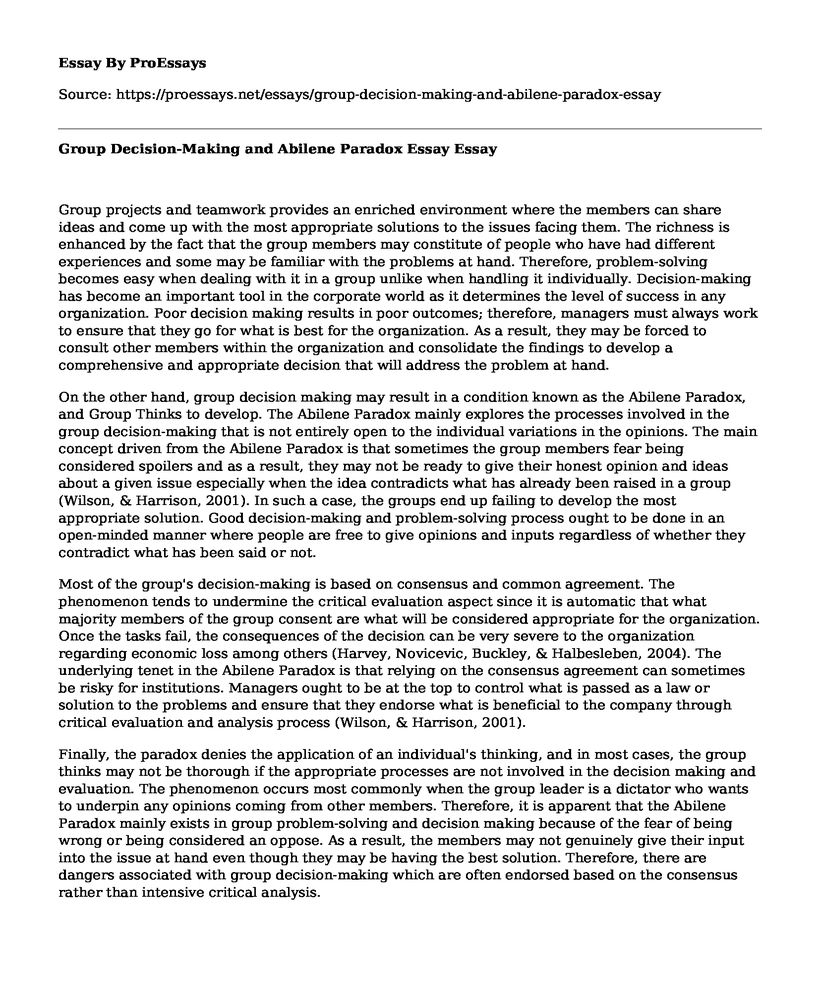Group projects and teamwork provides an enriched environment where the members can share ideas and come up with the most appropriate solutions to the issues facing them. The richness is enhanced by the fact that the group members may constitute of people who have had different experiences and some may be familiar with the problems at hand. Therefore, problem-solving becomes easy when dealing with it in a group unlike when handling it individually. Decision-making has become an important tool in the corporate world as it determines the level of success in any organization. Poor decision making results in poor outcomes; therefore, managers must always work to ensure that they go for what is best for the organization. As a result, they may be forced to consult other members within the organization and consolidate the findings to develop a comprehensive and appropriate decision that will address the problem at hand.
On the other hand, group decision making may result in a condition known as the Abilene Paradox, and Group Thinks to develop. The Abilene Paradox mainly explores the processes involved in the group decision-making that is not entirely open to the individual variations in the opinions. The main concept driven from the Abilene Paradox is that sometimes the group members fear being considered spoilers and as a result, they may not be ready to give their honest opinion and ideas about a given issue especially when the idea contradicts what has already been raised in a group (Wilson, & Harrison, 2001). In such a case, the groups end up failing to develop the most appropriate solution. Good decision-making and problem-solving process ought to be done in an open-minded manner where people are free to give opinions and inputs regardless of whether they contradict what has been said or not.
Most of the group's decision-making is based on consensus and common agreement. The phenomenon tends to undermine the critical evaluation aspect since it is automatic that what majority members of the group consent are what will be considered appropriate for the organization. Once the tasks fail, the consequences of the decision can be very severe to the organization regarding economic loss among others (Harvey, Novicevic, Buckley, & Halbesleben, 2004). The underlying tenet in the Abilene Paradox is that relying on the consensus agreement can sometimes be risky for institutions. Managers ought to be at the top to control what is passed as a law or solution to the problems and ensure that they endorse what is beneficial to the company through critical evaluation and analysis process (Wilson, & Harrison, 2001).
Finally, the paradox denies the application of an individual's thinking, and in most cases, the group thinks may not be thorough if the appropriate processes are not involved in the decision making and evaluation. The phenomenon occurs most commonly when the group leader is a dictator who wants to underpin any opinions coming from other members. Therefore, it is apparent that the Abilene Paradox mainly exists in group problem-solving and decision making because of the fear of being wrong or being considered an oppose. As a result, the members may not genuinely give their input into the issue at hand even though they may be having the best solution. Therefore, there are dangers associated with group decision-making which are often endorsed based on the consensus rather than intensive critical analysis.
References
Harvey, M., Novicevic, M. M., Buckley, M. R., & Halbesleben, J. R. (2004). The Abilene Paradox After Thirty Years:-A Global Perspective. Organizational Dynamics, 2(33), 215-226.
Wilson, J. A., & Harrison, M. (2001). The necessity of driving to Abilene. Organization Development Journal, 19(2), 99.
Cite this page
Group Decision-Making and Abilene Paradox Essay. (2022, Feb 16). Retrieved from https://proessays.net/essays/group-decision-making-and-abilene-paradox-essay
If you are the original author of this essay and no longer wish to have it published on the ProEssays website, please click below to request its removal:
- The Impact of Enron Corporate Culture to the Organization's Downfall
- My Leadership Challenges Paper Example
- Research Paper on Leadership-Cultural Intelligence
- Leadership, Strategic Thinking and Leadership Interview Questions
- Essay on Project Management: Precedence Diagramming Method for Activity Scheduling
- Exploring Ethical Dilemmas: Applying SRM's Decision-Making Model - Essay Sample
- Essay Example on Katharine Graham: A Leader Embodying Self-Awareness and Relationships







